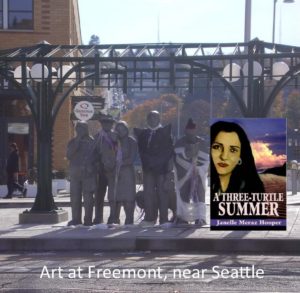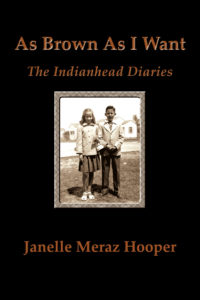
How I Find my Characters
Janelle Meraz Hooper
Some of you have asked where I find the unusual characters in my stories. They come from a lifelong habit of people watching! It started when I was a kid. On hot summer nights, when I was growing up in Oklahoma, we often piled into my Aunt Pat’s car, drove downtown, and parked right in the middle of the block.
With my Aunt in the driver’s seat and my mom riding shotgun, my cousin Bob and I would settle in for a night when the sidewalks were filled with Native Americans from several tribes, Mexicans, Lebanese, Germans, black people, and Asians. My aunt and mother knew a lot of people from each group and were on friendly terms with many of them. They often stopped by our car to visit and trade news about the latest powwow coming up, the German Octoberfest, which artists had signed up for the summer art show, and more. So, it shouldn’t be surprising that the seeds of observation were planted in my memory at an early age. Here’s a few ideas:
A Three-Turtle Summer, my first fictional autobiography in the Turtle Trilogy, I got lucky. I came from a large Hispanic family whose members I had adored all my life. They all signed releases thinking I’ve never get a novel started, much less finished!
In my Trilogy, I did change a few names. My Aunt Pat became Pauline. Not for any reason that I can think of. Maybe I was on a power trip! I renamed myself Glory because I didn’t think “Janelle” fit the character I was writing about.
As Brown as I Want, the middle book in my Turtle Trilogy has a lot going on including attempted murders, but once I realized I could write and control the story, I decided that I wanted my mom to (finally!) have a good man, so I added one more character. He ended up taking over the book! I found him at a powwow at the high school in Federal Way, Washington. He was sitting about six seats away and I couldn’t take my eyes off him. He looked like an Apache even though the Native Americans in Washington State were from other tribes. He had a long braid at the back of his head and his neatly pressed navy-blue cotton shirt had an allover design of tiny white arrows. He became my Powwow Pete—if he only knew! I never spoke to him, of course.
Custer & His Naked Ladies, the third novel in my Turtle Trilogy, had a lot of my family members from the first two books, but I needed two new characters, Soap and his mother. I couldn’t see him, but my new Soap drew me from across a drugstore at the mall in Lawton with his rich voice. When I finally found him at the cash register, I could see he was tall for a Comanche. Maybe a Kiowa? No matter. His hair was in a long black braid down his back and his baseball cap was on backwards. He wore his blue and white striped painter’s overalls with a vibrant Hawaiian shirt underneath. To me he looked like a Norman Rockwell painting. On his feet, he wore white, sockless, running shoes. Woot! There he was! Glory’s romantic interest. I needed him because although the first two novels were based upon my life, Custer & His Naked Ladies was fiction. I had already been married for years by the time I wrote Custer & His Naked Ladies. His mom, Maxine, came from a Native American that fed me and my cousin, Bob, fry bread at a powwow once. What a nice woman.
I have a lot of other books and stories, but you get the idea. For more information, follow the link to my Amazon Author page: https://www.amazon.com/author/janellehooper
![]()


